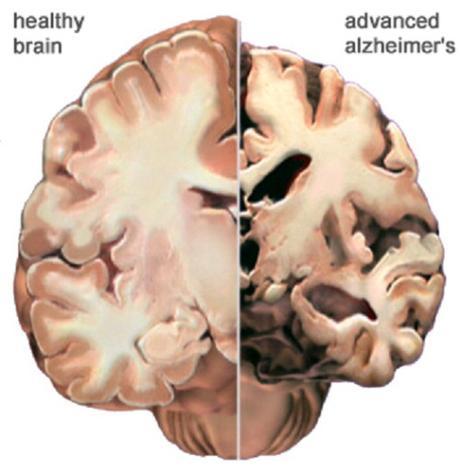, also known as senility, is a broad category of brain diseases that cause a long term decrease in the ability to think, remember, and speak. such that a person's daily functioning is affected. The most common type of dementia is Alzheimer's disease which makes up 50% to 70% of cases. Other common types include vascular dementia (25%), Lewy body dementia (15%), and frontotemporal dementia.

Daniela Deane reports for , Aug. 6, 2015, that a new 21-countries study finds that people across the world are developing dementia a decade earlier than 20 years ago.
The study, published in the Surgical Neurology International journal, compared 21 Western countries between the years 1989 and 2010, and found that the disease is now being regularly diagnosed in people in their late 40s and that death rates are soaring.
The study found that deaths caused by neurological disease had risen significantly in adults aged 55 to 74, virtually doubling in the over-75s:
- Dementias accounted for some 60% of the increase in deaths.
- The remaining 40% were other neurological diseases, such as Parkinson's and motor neurone disease.
The problem is particularly acute in the United States, where neurological deaths in men aged over 75 have nearly tripled and in women increased more than fivefold, the leader of the study, Colin Pritchard from Bournemouth University, told the London Times.
Pritchard said the sharp increase in death rates from dementia-related diseases cannot simply be blamed on an aging population or stepped-up diagnosis: " The rate of increase in such a short time suggested a silent or even a hidden epidemic, in which environmental factors must play a major part, not just aging ." No single factor is to blame, but instead a combination of environmental factors such as pollution from aircraft and cars, as well as widespread use of pesticides could be the culprit. "The environmental changes in the last 20 years have seen increases in the human environment of petro-chemicals - air transport, quadrupling of motor vehicles, insecticides and rises in background electro-magnetic field, and so on," Pritchard said.
Other experts quoted by the Times were skeptical about the causes for the increase:
- Tom Dening, professor of dementia research at the University of Nottingham, said that falling death rates for cancer and heart disease could account for the spike in deaths from neurological disease since people "had to die of something." [That sure makes a lot of sense. Not!]
- Dr. Simon Ridley, head of research at Alzheimer's Reserach UK, said, told the paper. ""We can't conclude that modern life is causing these conditions at a younger age. We know that Alzheimer's and other dementias can have a complex interplay of risk factors."
Pritchard warned, however, that it was "time for us to wake up and realize that a major problem we now face is unprecedented levels of neurological disease, not just the early dementias."
The increase in early-onset dementia has implications for both the patients, their families, and health care costs.
An article on diagnosing early onset dementia (EOD) in the International Journal of General Medicine points out that:
EOD poses a real problem to the patient, their family members and caregivers, doctors, health services, and residential programs. The challenges faced include difficulty in making the diagnosis, the impact of the diagnosis on family members and children (as EOD patients may still have younger offspring), employment, family and personal finances, and quality of life. [...] as early dementia affects patients who are still at an active age and vibrant in their social circles; the financial, health, wellbeing, social structure, and family losses create chaos in the family; wreak havoc in marital dynamics; and bring major uncertainties in terms of unemployment, financial issues, and long-term health care.
By the way, a new study says obesity can increase your chances of getting Azheimer's . I've hesitated to post this because of the hissy fit thrown by at the I did on obesity.
A new Iowa State University study found that obesity, or more specifically the insulin resistance that is common in those who are overweight, is strongly associated with memory loss and increases a person's risk of Alzheimer's disease. Past research already indicates that obesity also increases your risk of cardiovascular disease (heart attacks & strokes) and some cancers.
In addition to dementia, strokes also seem to be becoming more common among younger people. Experts think the increase may be due to a rise in risk factors such as diabetes, obesity and high cholesterol.
See also:

